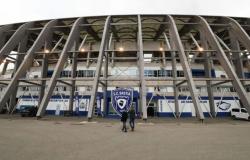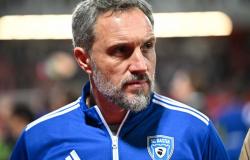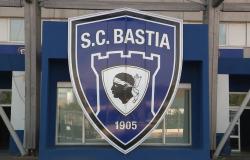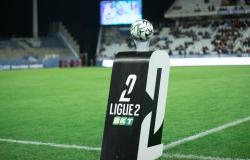![Olivier Pantaloni, the coach of FC Lorient, in immersion in Diwan [Vidéo]](https://euro.dayfr.com/temp/resized/medium_2024-11-15-5a3566456f.jpg)
We know him to be calm and rigorous on the edges of the Ligue 2 pitch, he is just as calm when facing a CM1 and CM2 class. This Thursday, November 14, Olivier Pantaloni spoke to the students of the Diwan school in Lorient, during a visit eagerly awaited by them. To talk about football, that goes without saying, but also regional identity. Originally from Bastia, the new leader of the merlus is also a fervent defender of Corsica, whose gastronomy, unique character and even language he publicly praises. A regional pride which finds a particular echo here, on Breton soil.
New cap
“I would like to talk to you about the language of my home. It’s singing, it looks like Italian, but it’s a language that is disappearing.” In the classroom, only a few words will be enough for the 57-year-old to capture absolute attention. Accustomed to motivating speeches and muscular debriefings, Olivier Pantaloni this time went into the field of pedagogy in front of a wise primary team. For an hour, the hake coach will speak unashamedly about his regional identity, while remaining attentive to questions. “Rather Ajaccio or Lorient? Are footballers nice? It seems that they don’t smell very good, Corsican cheeses”… The exchange was particularly rich and appreciated by the students, who will keep a surprise until the end: a Lorient song in the Breton language written by the Diwan network, at taste of merci and “Degemer mat”, for Olivier Pantaloni.
Successful transfer
This meeting is the result of a partnership between FC Lorient and the Diwan school in Lorient, started more than a year ago, which brings the Breton language to life through the football club. Every month, the club shares mood posts written by parents, while at the stadium, giant screens and jerseys proudly display the Breton language. “Today, we are further anchoring our partnership with Diwan,” argues Martin Le Blévec, FCL communications manager. As a token of recognition, the 2024-2025 jersey signed by the entire team was hand-delivered to Florian Pedrot, member of the parents’ association, to be displayed in the establishment.
For his part, the coach can pride himself on understanding a little more the Breton identity, his adopted land of which he shares many codes. « This is an important exchange for me. At home, in Corsica, we try to develop and preserve this language which is dear to me. Seeing children in total immersion with a regional language is an example to follow to preserve this heritage,” he explains. Understanding the challenges of a local language, he will finally leave the class with a moral that is as short as it is instructive: “Don’t let Breton get lost. You must be proud to speak this language and bring it to life.”
Senegal





